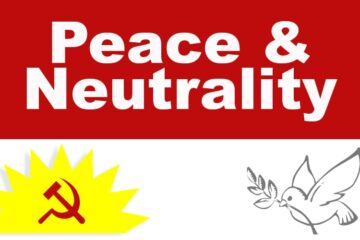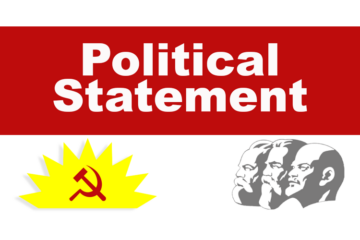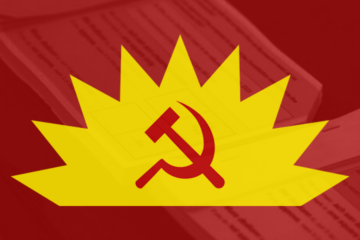At the time of writing, Yemeni resistance forces have targeted 49 cargo and military ships in the Red Sea and surrounding waters headed for Israel. These manoeuvres are an attempt by Ansar Allah and the coalition government in Sana’a to blockade Israel in solidarity with Palestine in response to the genocidal Israeli aggression against Gaza. The demands of Ansar Allah are plain. They would halt their attacks if Israel’s crimes in Gaza stop and food, medicines and fuel are allowed to reach its besieged population.
The bravery of the Ansar Allah, commonly referred to in the media as “the Iran-backed Houthis,” is nothing new; they have been fighting against outside influence, neo-colonialism and for the sovereignty of Yemen for nearly 40 years.
The Houthi movement, originally led by Hussein Al-Houthi, came about in the 1990s. They built resistance to Ali Abdullah Saleh who had been president of North Yemen since 1978, and reunified Yemen since 1990. Saleh was a willing partner of USAID, the IMF, and the World Bank, and for 30 years subjected the people of Yemen to neoliberal reforms and exposure to predatory global markets. Saleh and his allies became notoriously rich on corrupt deals facilitating international capital’s plunder of Yemen’s rich store of resources[1]. The Houthis resisted IMF “structural adjustment” arrangements that threatened grazing lands and water rights. Salah was collaborating with Saudi Arabia in 2000 to redraw boundaries so that some of Yemen’s best farming, grazing lands and water resources go to the Saudi Kingdom. This confirmed the belief among the North Yemenis that Saleh was in betrayal of Yemen[2]. Saleh branded the Houthi movement as foreign agents (often with reference to Iran) and therefore terrorists. Meanwhile, Saleh was positioning Yemen as a key US ally for their “war on terror.” So the West looked the other way when Saleh inflicted increasingly intense state violence on pockets of resistance to neo-colonial plunder in his own country under the guise of battling “Islamic terrorism”[3]. This collaboration led to the assassination of Hussein Al-Houthi in September 2004.
Opposition to the repression, corruption, and expropriation came to a head in 2011 with the march of the so-called Arab Spring. Demands for Saleh to step down mounted, but the existing order was preserved through a quiet counterrevolution. Obama and the Gulf Monarchies ensured that power was rotated to a collection of establishment figures in a transitional government structure[4]. Players who were, to quote Isa Blumi, “long profiteers from a regime that linked global demands to “liberalise” the national economy and sell off its best assets to “market” forces, these free agents of empire picked the right time to abandon the personally sinking ship of Saleh and his closest confidants”[5]. Saleh was replaced by his long-time vice president Abd Rabbu Mansur Hadi. His mandate was to restore confidence and prepare for elections. Instead, he launched Yemen into the World Trade Organisation[6], and set out on an unprecedented round of neoliberal structural adjustment and economic liberalisation, imposing austerity, privatisation, and facilitating land grabs by foreign investors.
Losing patience with Hadi’s continuation of Saleh’s policies, a coalition of forces allied with Ansar Allah occupied the capital Sana’a in August 2014. In September they established committees and agreed demands for securing a timeframe for elections, a halt to the firesale of Yemen’s assets, and a review of the wide-ranging laws enacted by the Hadi government. On September 21, 2014, with the assistance of Jamal Benomar, the appointed UN envoy to Yemen, interim President Hadi signed the Peace and National Partnership Agreement with Ansar Allah and leaders from all the major political parties[7].
In the following months, Hadi, the US embassy, the Saudis, Qatar, and political parties close to them sabotaged the negotiations. The UN envoy Benomar lamented how close they were to an agreement, but Hadi had been dragging his feet and exhausted the patience of everyone. On February 6 Ansar Allah announced a so-called “constitutional declaration”. This dissolved parliament, formed a five-member presidential council, and a Supreme Revolutionary Committee would run the country temporarily[8]. Hadi was released on the grounds that he and his US and Saudi backers would come back to the table with constructive dialogue about how to go forward. Instead, he was spirited away to Saudi Arabia from where his illegitimate government in exile called on Saudi Arabia to bomb his own country.
In March 2015, the Saudi-led coalition went to war to stop the prospect of peace, power sharing and independence in Yemen. With crucial US and British assistance, and barely a word from the usual human rights defenders, they killed hundreds of thousands of Yemeni people. The genocidal bombing and terror campaign systematically destroyed health, agriculture, sanitary and water infrastructure in an attempt to kill off the population through famine and disease.
Over the course of the war of resistance and to this day, Ansar Allah is a party in the ruling coalition, the National Salvation Government, that sits in Sana’a. The coalition has representatives from many of the political parties that existed before the war – Saleh’s General People’s Party, the southern separatists Hirak, the Yemeni Ba‘athist party, the Nasserists, Socialists, and Communist parties of Yemen. This coalition has overseen heroic resistance to a US-led war of aggression against one of the poorest countries on earth, while doing what they could to maintain ports, hospitals, and the ministries that add up to a functioning state. They have defended their sovereignty. While Yemen is a pillar of the axis of resistance, sharing tactics, training, and technology with Iran and Hezbollah, and showing deep solidarity with the people of Palestine today – to characterise the government in Sana’a as simply “Iran-backed Houthis” completely disregards the origins of the resistance movement in Yemen, their accomplishments and sacrifice in holding out against imperialist onslaught, and their collective demands and plans for the future of an independent and sovereign Yemen.
– F. Wallace, CPI International Newsletter, Vol.2 2024
[1] ‘UN says ex-Yemen president Saleh stole up to $60bn’, Aljazeera, 25 Feb 2015
[2] I. Blumi, Destroying Yemen: What Chaos in Arabia Tells Us about the World, University of California Press, 2018. p.166
[3] Ibid., p.168
[4] Daniel Green, ‘Yemen Redux: Reclaiming Stability in the Arabian Peninsula’, The Washington Institute for Near East Policy, Mar 30, 2015
[5] Blumi, p.188
[6] ‘Yemen to become 160th WTO member’, WTO News Item, 27 May 2014
[7] Blumi. p.4
[8] ‘Security Council Briefing on the Situation in Yemen, Special Adviser to the Secretary-General Jamal Benomar’, United Nations Political and Peacebuilding Affairs, 12 February 2015









